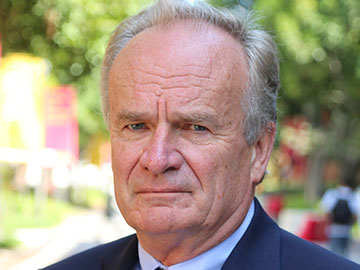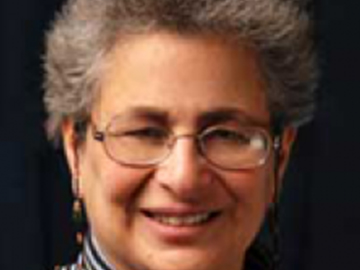





CREATE’s decision analysis researchers use rigorous models to help make sound decisions in homeland security applications related to terrorism and other catastrophic risks. Topics include:
- Representation of preferences and trade-offs using multiattribute value and utility models
- Representation of risk attitudes
- Modeling adversary beliefs and preferences
- Representation of belief using joint probability distributions and Bayesian learning
- Group decision making
- Framing decision situations
- Alternative generation
- The identification (and minimization) of cognitive biases
- Implementing a decision culture within enterprises
Game Theory is also applied to capture objectives and beliefs of adaptive adversaries threating critical infrastructure, including seaports, airports, wildlife/forests/fisheries, and high-crime urban areas. Limited resources must be allocated and scheduled efficiently, avoiding predictability while simultaneously accounting for adversaries’ responses to security coverage, adversary preferences, and uncertainty over such preferences and capabilities. Casting security allocation as a Stackelberg security game, our new algorithms have been used in multiple applications.
Researchers


Detlof von Winterfeldt
Detlof von Winterfeldt is a Professor at the Daniel J. Epstein Department of Industrial and Systems Engineering of the Viterbi School of Engineering and a Professor of Public Policy...


Richard John
Dr. Richard John serves as the Associate Director for Research at CREATE, professor in the Department of Psychology at the Dornsife College of Letters, Arts & Sciences at USC…


Vicki Bier
Vicki Bier is a risk analyst and decision analyst specializing in probabilistic risk analysis for homeland security and critical infrastructure protection. Her current research interests include…


Williams Burns
William Burns completed his Ph.D. at the University of Oregon in Decision Science and subsequently held positions as a professor at the University of Iowa and UC Davis …
Sam Chatterjee
Samrat Chatterjee is an Operations Research Scientist with the National Security Directorate at the Pacific Northwest National Laboratory (PNNL). His research focuses on assessing…


Robin Dillon-Merrill
Robin Dillon-Merrill is a Professor in the McDonough School of Business at Georgetown University and Area Coordinator for the Operations and Information Management Group…
Gilberto Montibeller
Gilberto Montibeller is a professor of Management Science at Loughborough University, and the Acting Associate Dean for Enterprise at the School of Business and Economics.


Heather Rosoff
Heather Rosoff’s research focuses on using risk and decision analytic techniques to study the uncertainties surrounding terrorism. More specifically, her risk perception…


Milind Tambe
Milind Tambe is Gordon McKay Professor of Computer Science and Director of the Center for Research in Computation and Society (CRCS) at Harvard University…
Sample Papers
- Siebert, J. & von Winterfeldt, D. (2020). Comparative Analysis of Terrorists’ Objectives, Decision Analysis, February 2020, https://doi.org/10.1287/deca.2019.0400.
- von Winterfeldt, D., Farrow, S., John, R., Eyer, J., Rose, A., & Rosoff, H. (2020). Assessing the Benefits and Costs of Homeland Security Research: A Risk-Informed Methodology with Applications to the U.S. Coast Guard. Risk Analysis, 40(3), 450-475. doi: 10.1111/risa.13403
- Kusumastuti, S., Rosoff, H., & John, R. S. (2019). Characterizing conflicting user values for cyber authentication using a virtual public values forum. Decision Analysis, 16(3), 157-171. doi: 10.1287/deca.2018.
- Cui,J., Nguyen, T., Pita, J., & John, R. S. (2017). Methods for addressing the unpredictable real-world element in security. In A. Abbas, M. Tambe, & D. von Winterfeldt (Eds.), Improving homeland security decisions (pp. 574-603). Cambridge University Press.
- Rosoff, H. & John, R. S. (2017). Decision analysis by proxy for the adaptive adversary. In A. Abbas, M. Tambe, & D. von Winterfeldt (Eds.), Improving homeland security decisions (pp. 709-729). Cambridge University Press.
- Cui, J., Rosoff, H., & John, R. S. (2017). Deterrence of cyber attackers in a three-player behavioral game. In S. Rass, B. An, C. Kiekintveld, F. Fang, & S. Schauer (Eds.), Decision and game theory for security: GameSec 2017 (pp. 718-736). New York: Springer.
- Nguyen, K., Rosoff, H., & John, R. S. (2017). Valuing equal protection in aviation security screening. Risk Analysis, 37(12), 2405-2419. doi: 10.1111/risa.12814
- Garcia, R. & von Winterfeldt, D. (2016) Defender-attacker decision tree analysis to counter terrorism. Risk Analysis, 36(8), 1-14.
- Siebert, J., von Winterfeldt, D., & John, R. S. (2016). Identifying and structuring the objectives of the “Islamic State of Iraq and the Levant” (ISIL) and its followers. Decision Analysis, 13(1), 26-50. doi: 10.1287/deca.2015.0324
- Montibeller, G. & von Winterfeldt, D. (2015). Cognitive and motivational biases in decision and risk analysis. Risk Analysis, 35, 7, pp. 1230-1251. doi: 10.1111/risa.12360
- Yang, R., Kiekintveld, C., Ordonez, F., Tambe, M., & John, R. S. (2013). Improving resource allocation strategies against human adversaries in security games: An extended study. Artificial Intelligence Journal, 195(2), 440-469. doi: 10.1016/j.artint.2012.11.004





